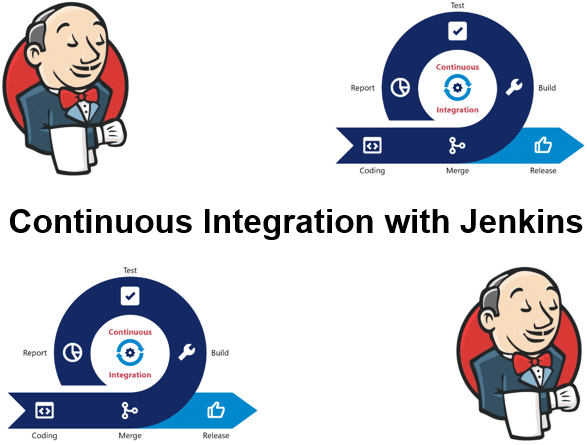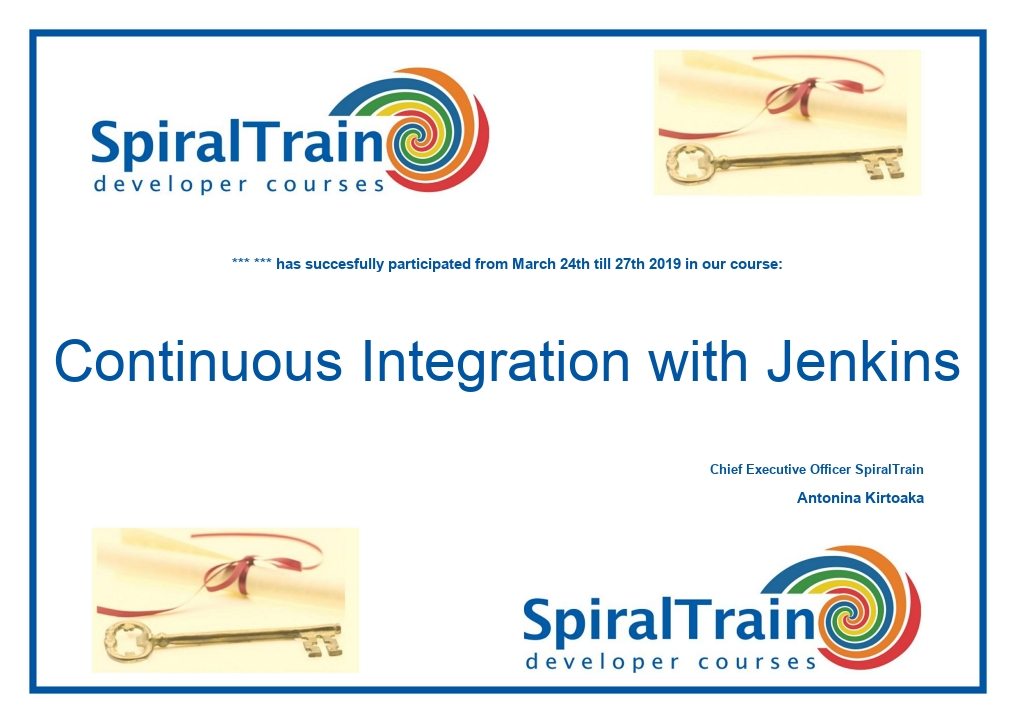-
Learning by doing
-
Trainers with practical experience
-
Classroom training
-
Detailed course material
-
Clear content description
-
Tailormade content possible
-
Training that proceeds
-
Small groups
In the course Continuous Integration with Jenkins from SpiralTrain participants learn how the latest version of Jenkins can be used to set up a continuous integration and continuous delivery (CI/CD) pipeline. CI/CD is a best practice in agile development where changes in the code of a software project are automatically tested and integrated.
CI/CD is part of the DevOps process whereby developers check in code regularly into a central repository and relevant tests and builds are automatically executed. Tools ensure that the new code is correct before it is integrated into the software project.
The course starts discussing the version control systems and build tools supported by Jenkins. Jenkins plugins, the Jenkins DSL and the Jenkins file are also treated.
You will learn then learn based on the Jenkins GUI and the Jenkins Dashboard, how to set up declarative and scripted pipelines in Jenkins. The role of Masters and Nodes, Agents and Executors are discussed and their relationship explained.
Attention is also paid to the triggering of jobs. Jobs can be triggered periodically or with input from the user based on parameters. Retries, timeouts, conditional and parallel execution are also on the course program.
Jenkins supports various project types such as Maven or Gradle projects, Freestyle projects, Pipeline and GitHub projects. The setup of such projects is explained as well as multibranch and external projects.
Finally various reporting options from Jenkins projects are discussed and how Jenkins and container technology such as Docker can work together.
The course Continuous Integration with Jenkins is intended for developers, testers and administrators who want to use Jenkins 2 to set up a continuous integration pipeline.
Experience with IT projects in a DevOps environment with the Agile Development methodology and Scrum is beneficial for the understanding but not strictly necessary.
The theory is discussed on the basis of presentations and demos and is interchanged with exercises. Demo projects clarify the discussed concepts. The course is done in the latest version of Jenkins, version 2. Course times are from 9.30 up and to 16.30.
After successful completion of the course the participants receive an official certificate Continuous Integration with Jenkins.

Module 1 : Jenkins Intro |
Module 2 : Creating Pipelines |
Module 3 : Pipeline Execution |
|
What is Jenkins? Continuous Integration Hudson Predecessor Version Control Git, CVS and BitBucket Build Tool Support Distributed Builds Jenkins Plugins Installing Jenkins The Jenkinsfile Jenkins DSL Groovy Scripts |
Declarative Pipelines Jenkins GUI Jenkins Dashboard Blue Ocean Pipeline Structure Pipeline Development Scripted Pipelines Declarative Pipelines Masters and Nodes, Agents and Executors Snippet Generator Running Pipelines |
Triggering Jobs Build After Build Periodically Cron Syntax Poll SCM User Input Parameters Flow Control Options timeout and retry Conditional Execution Parallel Execution Handling Concurrency |
Module 4 : Project Types |
Module 5 : Reports |
Module 6 : Integrating Containers |
|
Freestyle Projects Maven Projects Discard Old Builds GitHub Projects Throttle Builds Build Environment Post-Build Actions Pipeline Projects External Project Types Multiconfigurations Multibranch Projects Branch Indexing |
Notifications Jenkins URL Email Notifications Build Results Collaboration Services Webhooks in Slack Default Notifications HipChat Plugin HTML Reports Publishing Reports Integrating Artifacts Conversions |
Docker in Pipeline Configured as a Cloud Docker Images as Agents SSH Credentials Container Settings Launching Options Persistent Docker Nodes Global Variables withDockerRegistry Pipeline inside Method Docker via Shell Other Interfaces |
